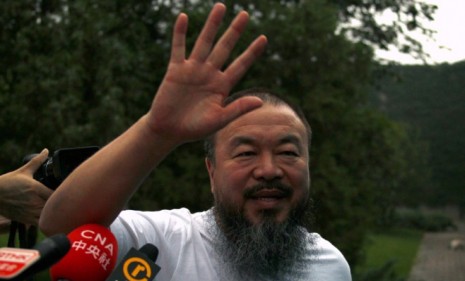What Ai Weiwei's release means: 3 theories
China shocked the world by freeing the renowned activist after nearly three months in detention. What happened?

A free daily email with the biggest news stories of the day – and the best features from TheWeek.com
You are now subscribed
Your newsletter sign-up was successful
China unexpectedly released artist and activist Ai Weiwei on Wednesday, following a months-long international campaign by human rights activists, artists, and Western governments. China arrested Ai on April 3 for alleged tax evasion — just "like Al Capone," notes Noreen Malone at New York. Now, they're citing his poor health and "good attitude in confessing his crimes... repeatedly" in freeing him on bail. The normally outspoken Ai says he can't talk to the media for a year under the terms of his probation. But plenty of others have theories on the meaning of his release. Here are three:
1. China isn't immune to public pressure
Freeing Ai on bail "appears to be a face-saving comprise for Chinese authorities," says Peter Foster in Britain's Telegraph. And it proves that China can be swayed by "intense international public pressure," especially in "egregious cases" like Ai's. "The public pressure was effective," agrees Evan Osnos in The New Yorker. But Ai's release "must also be read in terms of Chinese diplomatic calculations." It's no coincidence that Prime Minister Wen Jiabao is on his way to visit several European countries critical of China's recent crackdown on dissidents.
The Week
Escape your echo chamber. Get the facts behind the news, plus analysis from multiple perspectives.

Sign up for The Week's Free Newsletters
From our morning news briefing to a weekly Good News Newsletter, get the best of The Week delivered directly to your inbox.
From our morning news briefing to a weekly Good News Newsletter, get the best of The Week delivered directly to your inbox.
2. Influential individuals can trump China's regime
Ai became a cause célèbre abroad, especially in the art world, but he "may partly owe his freedom to his influence at home," says James Miles in The Economist. He's not just famous, he's also the son of Ai Qing, "one of the Communist Party's most celebrated poets," whom Wen himself has quoted in speeches. Also, unlike China's other political prisoners, Ai's "absence didn't silence him or his works," says Blake Gopnik at The Daily Beast. If fact, being locked up became Ai's greatest "oppositional art" piece, amplifying and strengthening his call for greater freedom.
3. But China can still silence its citizens — even Ai
It's "heartening" to see Ai safe at home, but keep in mind that he'll "be under intense pressure not to speak out and may still be held under an extralegal form of house arrest," says The Wall Street Journal in an editorial. This legal "purgatory that hides political prisoners in plain sight" is China's new favorite tactic for dealing with dissidents, since the threat of prison is no longer enough to maintain silence, and actual prison just creates martyrs. "Turning Beijing's apartment buildings into plain-clothes prisons for the intellectual elite may be ingenious," but it's hardly progress.
A free daily email with the biggest news stories of the day – and the best features from TheWeek.com
-
 Corruption: The spy sheikh and the president
Corruption: The spy sheikh and the presidentFeature Trump is at the center of another scandal
-
 Putin’s shadow war
Putin’s shadow warFeature The Kremlin is waging a campaign of sabotage and subversion against Ukraine’s allies in the West
-
 Media: Why did Bezos gut ‘The Washington Post’?
Media: Why did Bezos gut ‘The Washington Post’?Feature Possibilities include to curry favor with Trump or to try to end financial losses